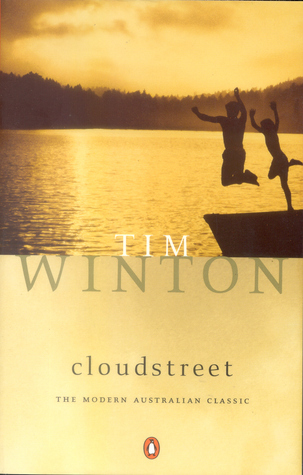What do you think?
Rate this book


426 pages, Paperback
First published January 1, 1991


It was as though luck made choices, that it could think. If you greeted it, it came to you; if you shunned it, it backed away.The old grand dame of dilapidation had her own story to tell. The music room at the end of the hall, was a dark, moldy room with no windows, no light. It was the place where the old wealthy woman died in solitude, with her nose stuck to middle C on the piano when she was eventually found.
"... They lived like some newspaper cartoon – yokels, bumpkins, fruitcakes in their passed down mended up clothes, ordered like an army floorshow. They worked their bums off and took life seriously: there was good and bad, punishment and reward and the isolation of queerness. But there was love too, and always there was music and dancing and jokes, even in the miserable times..."In my opinion, this story was perfection! There's not one single thing I would change. Winton wrote the book over a four-year period. How wonderful it must have been for him to live with these amazing people for such a long time! It's certain he'll never forget them; I don't think I will either.
From above, the two-up circle looks like a sea creature, some simple hungry organism in the water of night. A sea anemone whose edges rise and fall as bodies press and spread with two glittering morsels turning and dangling in its maw. Two coins spinning above the pulsating mouth, catching light and shining to tantalize. But they’re men down there and the coins’ light shines on them the way the sun and moon have never done. A swearing, moneyflicking, beery mob of blokes dancing to the music of the toss, the dance of chance. They call in intercession, they pray and whine and moan as if those two big crosspainted pennies can hear them. See among them the little fella with the stump and the mad light in his eyes, crazy as a crusader, mad as a cut snake, driven as a dog.Cloudstreet is my second Tim Winton novel, after reading Dirt Music a few years back.

In the dawn the sky was clearing and summery steam rose off the jetty piles, and out of the steam came the black man looking completely unsurprised.
Geez, said Quick, recognising him fearfully. Haven't you got a home to go to?
Not this side.
Quick looked across the river. Through the steam he thought he saw moving figures, dark outlines on the far bank.
Are you real?
The black fella laughed. Are you?
Quick kicked the muddy grass before him.
You've got a home to go to. Quick. Go there.
Quick regarded the man. He was naked, naked enough to arrest.
Go there.
Orright, said PC Quick, already on his way. When he turned back, high on the hill, he saw more than one black man. He saw dozens of them beneath the trees, hundreds like a necklace at the throat of the city.